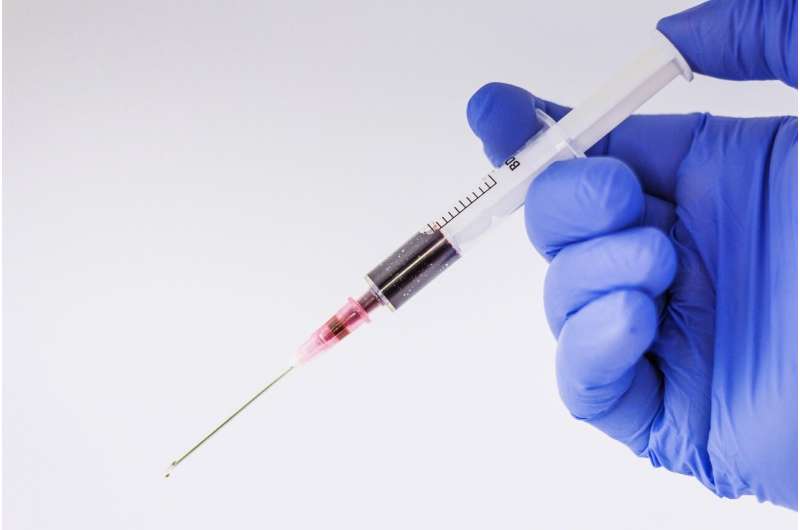Memory concerns? Blood test may put mind at ease or pave way to promising treatments

A blood test that may eventually be done in a doctor's office can swiftly reveal if a patient with memory issues has Alzheimer's disease or mild cognitive impairment and can also distinguish both conditions from frontotemporal dementia. If approved, the blood test could lead to a jump in the number of Alzheimer's patients enrolling in clinical trials and be used to monitor response to those investigational treatments.
In a study led by UC San Francisco, researchers measured blood levels of phosphorylated tau 181 (pTau181), a brain protein that aggregates in tangles in patients with Alzheimer's. They found that pTau181 was 3.5-times higher in people with the disease compared to their healthy peers. In contrast, in patients with frontotemporal dementia, a condition that is often misdiagnosed as Alzheimer's, pTau181 was found to be within the same range as the control group.
The study publishes in Nature Medicine on March 2, 2020.
"This test could eventually be deployed in a primary care setting for people with memory concerns to identify who should be referred to specialized centers to participate in clinical trials or to be treated with new Alzheimer's therapies, once they are approved," said senior author Adam Boxer, MD, Ph.D., of the UCSF Memory and Aging Center. Being able to easily diagnose Alzheimer's disease at early stages may be especially beneficial to patients with mild cognitive impairment, some of whom may have early Alzheimer's disease. Individuals with early Alzheimer's are more likely to respond to many of the new treatments that are being developed."
Current Alzheimer's Testing Expensive, Invasive
Existing methods for diagnosing Alzheimer's include measurement of the deposits of amyloid, another protein implicated in dementia, from a PET scan; or using lumbar puncture to quantify amyloid and tau in cerebrospinal fluid. PET scans are expensive, only available in specialized centers and currently not covered by insurance, and lumbar punctures are invasive, labor intensive and not easy to perform in large populations, the authors noted.
There are 132 drugs in clinical trials for Alzheimer's, according to a 2019 study, including 28 that are being tested in 42 phase-3 trials—the final part of a study before approval is sought from the federal Food and Drug Administration. Among those phase-3 drugs is aducanumab, which some experts believe may be the first drug approved to slow the progression of Alzheimer's.
In the study, participants underwent testing to measure pTau181 from plasma, the liquid part of blood. They were aged from 58 to 70 and included 56 who had been diagnosed with Alzheimer's, 47 with mild cognitive impairment and 69 of their healthy peers. Additionally, participants included 190 people with different types of frontotemporal dementia, a group of brain disorders caused by degeneration of the frontal and temporal lobes, areas of the brain associated with decision-making, behavioral control, emotion and language. Among adults under 65, frontotemporal dementia is as common as Alzheimer's.
Blood Test Measures Up to Established Tool
The researchers found that blood measures of pTau181 were 2.4 pg/ml among healthy controls, 3.7 pg/ml among those with mild cognitive impairment and 8.4 pg/ml for those with Alzheimer's. In people with variants of frontotemporal dementia, levels ranged from 1.9 to 2.8 pg/ml. These results gave similar information to the more established diagnostic tools of PET scan measures of amyloid or tau protein, Boxer said.
The study follows research by other investigators published last year that found high levels of plasma amyloid were a predictor of Alzheimer's. However, amyloid accumulates in the brain many years before symptoms emerge, if they emerge, said Boxer, who is affiliated with the UCSF Weill Institute for Neurosciences.
"In contrast, the amount of tau that accumulates in the brain is very strongly linked to the onset, the severity and characteristic symptoms of the disease," he said.
A companion study by Oskar Hansson, MD, Ph.D., of Lund University, Sweden, published in the same issue of Nature Medicine corroborated the results of the UCSF-led study. It concluded that pTau181 was a stronger predictor of developing Alzheimer's in healthy elders than amyloid.
The researchers said they hope to see the blood test available in doctor's offices within five years.
More information: Diagnostic value of plasma phosphorylated tau181 in Alzheimer's disease and frontotemporal lobar degeneration, Nature Medicine (2020). DOI: 10.1038/s41591-020-0762-2 , nature.com/articles/s41591-020-0762-2


















